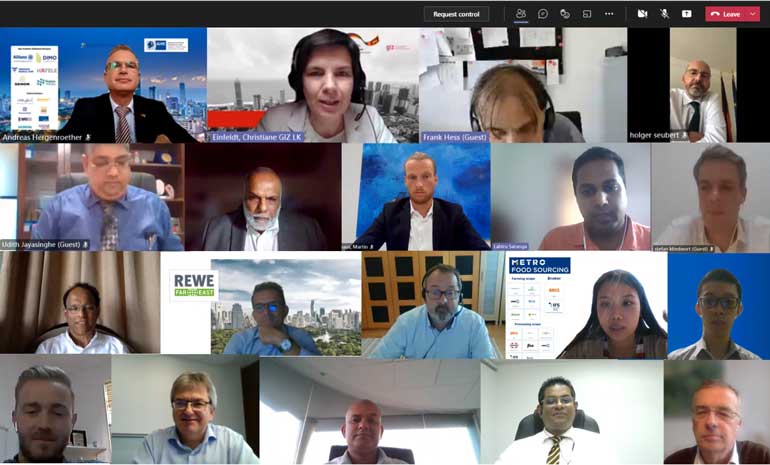Tuesday Feb 17, 2026
Tuesday Feb 17, 2026
Monday, 23 August 2021 00:00 - - {{hitsCtrl.values.hits}}

More than 150 decisionmakers of European importers, retailers and wholesalers met and discussed virtually with certified Sri Lankan exporters of organic products in presence of Ministry of Agriculture Secretary Prof. Udith Jayasinghe, German Ambassador Holger Seubert, Head of Development Cooperation of Delegation of the European Union to Sri Lanka and GIZ Country Director Christiane Einfeldt, and Chief Delegate of German Industry and Commerce in Sri Lanka Andreas Hergenroether.
On the occasion of a virtual business delegation, which consisted of some of the world’s leading retailers such as REWE, Lidl and Metro as well as specialised importers of organic food such as Kreyenhop & Kluge, Clama, Horst Bode, ISKG and Rila, an integrated conference and individual B2B-meetings have been organised by the Delegation of German Industry and Commerce in Sri Lanka (AHK Sri Lanka) in cooperation with GIZ.
The event co-funded by the European Union (EU) and the German Federal Ministry for Economic Cooperation and Development (BMZ).
The major objective of the initiative is to support Sri Lankan exporters of organic products by matching them with European buyers and importers. During the upcoming days European buyers will be individually matched according to their specific requirements with Sri Lankan exporters. In the course of the preparation of the B2B-meetings by AHK Sri Lanka the importance of standards and certification became evident.
Apart from the legally required certifications in the EU there are specific consumer and industry driven standards that are required by European importers when it comes to quality, food security as well as sustainability. Today, it is not sufficient to obtain a European organic certification, but industry and consumer driven certifications such as IFS, BRC, ISO 22000 or BSCI, SA 8000, SMETA etc. must be obtained to get a broader market access to the EU.
Market access and future export earnings will depend very much on the ability to meet these requirements and standards. The potential is tremendous. Today, the Organic World Market is about $ 110 billion. The EU with its 27 EU-member states with a total population of 450 million inhabitants is the second largest single market with a continuously growing volume in retail sales of $ 41.4 billion behind the US. Within the EU Germany is the largest organic market with a volume almost $ 12 billion and equally the second largest organic market in the world.
The organic market recorded a growth rate of 8% in the EU. Within the EU the largest growth rate was recorded in France with 13,4%. During the last decade organic market values have more than doubled.